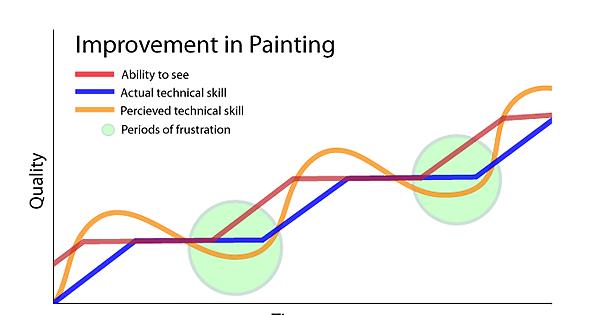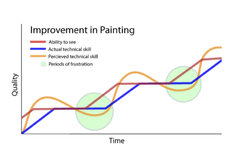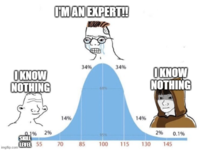Gabler
Masterpiece
I was reminded today of this graphic about learning to paint. It seems to me that it's not just true for painters, but for any art, craft, or otherwise creative endeavor.

 imgur.io
imgur.io

Basically, as you learn an art, there are periods where your ability to see will outstrip your actual technique, and that causes a mismatch in perceived and actual ability. Sometimes you'll think you're worse than you are, because you'll start to notice where your work has shortcomings. They're labelled "periods of frustration" on the graphic. Other times, your actual skill will catch up to your ability to see your flaws, and you'll get a false sense of confidence, since you won't see any flaws in your work.
Another example I found looks like this:
 jo-sews-etc.blogspot.com
jo-sews-etc.blogspot.com

It's probably a good thing to keep in mind for bonsai. It's easy to get stuck at the "naively confident" stage for a while, since there's such a long delay in bonsai between applying a technique and observing the tree's response. I assume it has something to do with the widespread myths about growing bonsai which, for example, Hagedorn aimed to debunk in Bonsai Heresy.

A Graph I Made Describing the Learning Process in Painting
Discover the magic of the internet at Imgur, a community powered entertainment destination. Lift your spirits with funny jokes, trending memes, entertaining gifs, inspiring stories, viral videos, and so much more from users.

Basically, as you learn an art, there are periods where your ability to see will outstrip your actual technique, and that causes a mismatch in perceived and actual ability. Sometimes you'll think you're worse than you are, because you'll start to notice where your work has shortcomings. They're labelled "periods of frustration" on the graphic. Other times, your actual skill will catch up to your ability to see your flaws, and you'll get a false sense of confidence, since you won't see any flaws in your work.
Another example I found looks like this:
The wearability learning curve
Jo sews - and, among other things, blogs about it.

It's probably a good thing to keep in mind for bonsai. It's easy to get stuck at the "naively confident" stage for a while, since there's such a long delay in bonsai between applying a technique and observing the tree's response. I assume it has something to do with the widespread myths about growing bonsai which, for example, Hagedorn aimed to debunk in Bonsai Heresy.

